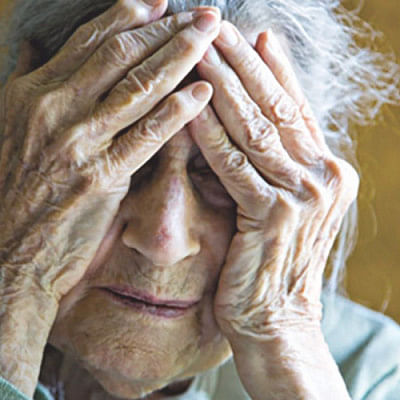Alzheimer's disease and dementia

Worldwide, at least 44 million people are living with dementia, making the disease a global health crisis. A diagnosis of Alzheimer's is life changing for the person with the disease, as well as their family and friends, but information and support are available. Alzheimer's disease is the most common type of dementia. Alzheimer's causes problems with memory, thinking and behaviour.
In the early stage, dementia symptoms may be minimal, but as the disease causes more damage to the brain, symptoms worsen. While there are currently no treatments to stop Alzheimer's disease from progressing, there are medications to treat dementia symptoms.
Trouble with memory is often the first symptom of Alzheimer's disease. As we grow older, our brains change, and we may have occasional problems remembering certain details. These symptoms are not a natural part of getting older. In addition to memory loss, symptoms of Alzheimer's include: trouble completing tasks that were once easy; difficulty solving problems; changes in mood or personality; withdrawing from friends and family; problems with communication, either written or spoken; confusion about places, people and events; visual changes, such as trouble understanding images.
Family and friends may notice the symptoms of Alzheimer's and other progressive dementia before the person experiencing these changes. It is important to seek a medical evaluation to find the cause.
Age: Advancing age is the greatest risk factor for developing Alzheimer's disease. The majority of people diagnosed with Alzheimer's disease are 65 or older.
Family members with Alzheimer's: If parent or sibling develops Alzheimer's, it is more likely to develop the disease.
Cardiovascular disease: Research suggests that brain health is closely related to heart and blood vessel health. The brain gets the oxygen and nutrients needed to function normally from blood, and the heart is responsible for pumping blood to the brain.
Traumatic brain injury: The risk of Alzheimer's disease and other dementia increases after a moderate or severe traumatic brain injury, such as a blow to the head or injury of the skull that causes amnesia or loss of consciousness for more than 30 minutes. Individuals who sustain repeated brain injuries, such as athletes and those in combat, are also at a higher risk of developing dementia and impairment of thinking skills.
There is not a simple test to tell us if someone has Alzheimer's. Diagnosis requires a comprehensive medical evaluation, which may include: blood tests, mental status tests and brain imaging may be used to determine the cause of symptoms.
While doctors can usually determine if someone has dementia, it may be more difficult to distinguish what type of dementia. Receiving an accurate diagnosis earlier in the disease process is important.
Several medications can temporarily help improve the symptoms of dementia for some people. These medications work by increasing neurotransmitters in the brain. In addition, having support systems in place and the use of non-pharmacologic behavioural interventions can improve quality of life for both people with dementia and their caregivers and families.
In the early stages of dementia, a person may remain independent and need very little care. However, as the disease progresses, care needs will intensify, eventually leading to a need for around-the-clock assistance.
The writer is a gerontologist and a public health specialist.
E-mail: [email protected]

 For all latest news, follow The Daily Star's Google News channel.
For all latest news, follow The Daily Star's Google News channel. 



Comments